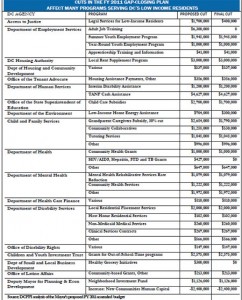On Tuesday, December 7, the DC Council approved a plan to address a $188 million budget shortfall for the current fiscal year. The Council restored a number of budget cuts proposed by Mayor Fenty, including cuts to job training and a handful of other low-income programs. Yet the final budget left many vital low-income program cuts in place, including cuts to basic income assistance to thousands of families with children.
Several Councilmembers argued that it is imperative to tighten our belts now, because budget problems for the coming fiscal year are even greater. While this argument has merit, it is not clear why cuts to vital programs for low-income residents were seen as effective ways to cut services. In fact, many of the remaining cuts will not only hurt vulnerable families still reeling from the recession, but may actually end up putting more strain on other parts of DC government as families turn to more expensive emergency programs and services. And while some of the cuts that the Council restored are critical to the city’s future ‘ including adult job training ‘ such efforts to help poor communities recover from the recession will be undermined by benefit cuts that put added strain on poor families.
The Council also considered ‘ but rejected ‘ several proposals to raise taxes that would have mitigated the cuts. It is noteworthy that Mayor-elect Gray and a majority of the DC Council seem to recognize that revenue increases will be needed for the 2012 budget. Gray noted that we cannot address the looming budget gap solely with cuts, and that some revenue increases are likely to be needed. We look forward to starting a discussion early in January about the right ways to reform DC’s tax system and raise needed revenues.
A full analysis of the changes to DC’s budget will be coming later this week from DCFPI, but in the meantime, below is a brief summary of what happened to cuts for low-income programs during Tuesday’s vote.
What was restored? The major cuts to low-income programs that the Council chose to restore are:
- $6.3 million for adult job training
- $4.6 million to implement the Healthy Schools Act (this restored most but not all of the cut)
- $1.4 million of a $1.7 million cut to civil legal services for low-income residents
- $1 million for child care
- $400,000 of a $700,000 cut to energy assistance for families behind on utility bills.
- $900,000 of a $2.7 million cut for the Grandparent Caregiver program
What wasn’t restored? Of $43 million in low-income cuts in Mayor Fenty’s plan, $9 million were restored by the Council. The major remaining budget cuts to low-income programs that the Council approved are:
- A $4.6 million cut in TANF, which equals a 20 percent reduction in benefits for 7,800 families with children that have been on assistance for 60 months. The cut will go into effect almost immediately, even though TANF recipients would receive no additional services to help get a job.
- A $1.2 million cut in Interim Disability Assistance, which will deny cash aid to 350 poor residents with disabilities who are unable to work and have pending applications for federal disability benefits.
- A $2 million cut to rental assistance for residents with intellectual disabilities, which will result in 200 residents being denied assistance.
- A $300,000 cut in energy assistance, which will deny emergency utility aid to about 400 families at the same time that the number of DC households facing utility shut-offs have increased by one-third in the recession.
- A $1.8 million cut to the grandparent caregiver program, which will reduce aid by $2,500 a year for 700 children being cared for by grandparents.
Check back to DCFPI.org later this week for a full report on the changes made to the FY 2011 budget.

